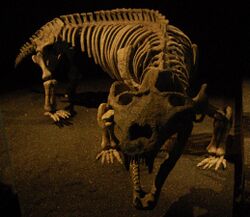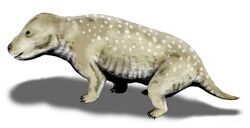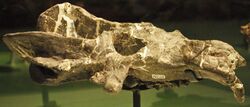Biology:Exaeretodon
| Exaeretodon | |
|---|---|

| |
| Exhibit at Mori Tower | |
| Scientific classification | |
| Domain: | Eukaryota |
| Kingdom: | Animalia |
| Phylum: | Chordata |
| Clade: | Synapsida |
| Clade: | Therapsida |
| Clade: | Cynodontia |
| Family: | †Traversodontidae |
| Subfamily: | †Gomphodontosuchinae |
| Genus: | †Exaeretodon Cabrera, 1943 |
| Species | |
| |
| Synonyms | |
| |
Exaeretodon is an extinct genus of fairly large, low-slung traversodontid cynodonts from the southern parts of Pangea. Four species are known, from various formations. E. argentinus is from the Carnian-age (Late Triassic) Cancha de Bochas Member of the Ischigualasto Formation in the Ischigualasto-Villa Unión Basin in northwestern Argentina . E. major and E. riograndensis are from the Carnian-age portion of the Santa Maria Formation of the Paraná Basin in southeastern Brazil .[1] E. statisticae is from the Carnian-age Lower Maleri Formation of India .
Description
This genus was an herbivore up to 1.8 meters (5.9 feet) long, with a specialized grinding action when feeding.
An analysis of the size of the bones of calves collected in Paleorrota concluded that the mother Exaeretodon had one or two calves, for one pregnancy.[citation needed]
Taxonomy
Exaeretodon is a gomphodontosuchine cynodont.[2] When he first named the species, Argentine paleontologist José Bonaparte mentioned several features that distinguish it from all other traversodontids. The tooth rows of the upper jaw are more parallel to each other in Ischignathus sudamericanus than they are in Exaeretodon, and they are also inset closer to the inside of the mouth. There are also more postcanine teeth oriented toward middle of the subtemporal fenestrae (two holes in the bottom of the skull) and ascending rama of the dentary (projections of the lower jaw that extend up to the skull). The ascending rama are also wider and taller in the I. sudamericanus specimen. The orbit or eye socket is longer than that of Exaeretodon, as are the palatine bones.[3]
Despite the differences, a 2007 study concluded that the I. sudamericanus skull represents the same species as E. argentinus. Using allometry, paleontologist Jun Liu found I. sudamericanus to be the largest known example of a growth series in E. argentinus. Thus, Ischignathus is now regarded as a junior synonym of Exaeretodon. As the animal grew, the proportions of bones changed. These differing proportions were initially seen as species-distinguishing characters, but are now regarded as natural ontogenic variation.[3]
Proexaeretodon vince was considered a synonym of Exaeretodon argentinus but was accepted as a valid taxon in 2023.[2]
Phylogeny
Exaeretodon in a cladogram after Kammerer et al. (2012):[4]
| Cynognathia |
| ||||||||||||||||||||||||||||||||||||||||||||||||||||||||||||||||||||||||||||||||||||||||||||||||||||||
See also
References
- ↑ Langer, Max C.; Ramezani, Jahandar; Da Rosa, Átila A.S. (May 2018). "U-Pb age constraints on dinosaur rise from south Brazil". Gondwana Research 57: 133–140. doi:10.1016/j.gr.2018.01.005.
- ↑ 2.0 2.1 Schmitt, Maurício Rodrigo; Martinelli, Agustín Guillermo; Kaiuca, João Felipe Leal; Schultz, Cesar Leandro; Soares, Marina Bento (2023). "Old fossil findings in the Upper Triassic rocks of southern Brazil improve diversity of traversodontid cynodonts (Therapsida, Cynodontia)". The Anatomical Record: 1–41. doi:10.1002/ar.25244. PMID 37246488.
- ↑ 3.0 3.1 Liu, J. (2007). "The taxonomy of the traversodontid cynodonts Exaeretodon and Ischignathus". Revista Brasileira de Paleontologia 10 (2): 133–136. doi:10.4072/rbp.2007.2.07. http://www.sbpbrasil.org/revista/edicoes/10_2/liu.pdf.
- ↑ Kammerer, C. F.; Flynn, J. J.; Ranivoharimanana, L.; Wyss, A. R. (2012). "Ontogeny in the Malagasy Traversodontid Dadadon isaloi and a Reconsideration of its Phylogenetic Relationships". Fieldiana Life and Earth Sciences 5: 112–125. doi:10.3158/2158-5520-5.1.112.
Wikidata ☰ Q1905071 entry
 |



